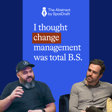
Ep 32: From Product Counseling at Apple & Meta to the Crypto World: Nguyen Vu, DGC, OKX
How do you realign your legal career in order to break into the tech industry and product counseling? What are the major differences between headline-grabbing big tech companies and ambitious start-ups? And should the goal of every in-house counsel be a GC title?
Nguyen Vu, deputy general counsel at OKX, leveraged his persistence, skills, and showmanship to redefine himself as a tech attorney. Starting off as a lawyer working in telecoms regulation, Nguyen was able to land a major product role at Apple, become the “mini GC” of digital currency at Facebook, and lead international product teams at successful fintech and crypto startups.
Hear Ngyuen as he shares the valuable lessons he’s learned about regulation, consumer protection, motivating your team, steering your career in the direction you want to take it, and more.
Read detailed summary: https://www.spotdraft.com/podcast/episode-32
Topics:
Introduction: 0:00
Beginning your career during the Great Recession: 3:21
Moving beyond telecoms law: 6:10
Landing a dream role at Apple: 9:07
Coming into your own as a product attorney: 11:44
Defining the role of a product counselor: 18:45
Joining Facebook’s digital currency project: 20:10
Getting off of career plateaus and joining Bolt: 25:06
Navigating the difficulties of managing a legal team at a start-up: 28:43
Encountering “Big Company Bias”: 31:34
Becoming deputy general counsel at OKX: 36:33
Book recommendations: 40:10
Advice to your younger self: 41:36
Connect with us:
Nguyen Vu - https://www.linkedin.com/in/nguyentvu/
Tyler Finn - https://www.linkedin.com/in/tylerhfinn
SpotDraft - https://www.linkedin.com/company/spotdraft
SpotDraft is a leading CLM platform that solves your end-to-end contract management issues. Visit https://www.spotdraft.com to learn more.



















